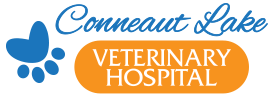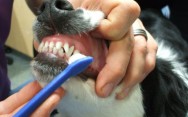COMMONLY ASKED QUESTIONS
FAQ FOR YOUR VETERINARIAN
-
What paperwork should I bring with me for my pet's first visit?Open or Close
Bring any/all paperwork that you were given from the breeder, shelter or rescue group when you got your new pet so that our veterinarian can review any care schedule that has been started. This is especially needed to keep your pet on his/her vaccination booster series time schedule.
-
At what age do I need to get my dog licensed?Open or Close
All dogs 3 months of age or older must be licensed. You may go to the Crawford County Treasurer's office or call us for more information. Dog licenses are available for purchase here at Conneaut Lake Veterinary Hospital January through April each year.
-
Is there a way I can give my dog some sort of lifetime licensing?Open or Close
Yes. After your pet receives his/her microchip, the documentation you are presented with can be taken to the Crawford County Treasurer's office and for a fee the county will recognize this micro chip number as a means of lifetime licensing for your dog.
-
Does my cat need to be licensed?Open or Close
No, not at this time. Crawford County does NOT require cats to be licensed.
-
What are Pennsylvania's rabies vaccination requirements?Open or Close
Owners of dogs and non feral cats 3 months of age or older are required to have a current rabies vaccination. It is illegal to interfere with an officer or employee of the Pennsylvania Department of Agriculture engaged in enforcement of dog laws.
-
FAQ That May be Asked During my Pet's ExamOpen or Close
- How long have you had your pet? Do you know how old your pet is?
- Where did you get your pet?
- Has your pet been vaccinated? Against what diseases?
- Is your pet spayed or neutered?
- What brand of pet food do you feed your pet?
- Is your pet’s appetite normal? How much does he eat?
- Does your pet seem to be drinking enough water and staying hydrated?
- Is your pet urinating and defecating regularly? Does he ever have accidents inside?
- Is your pet displaying any of the following symptoms?Coughing?Sneezing?Vomiting?Diarrhea?
- Has your pet lost or gained weight recently?
- Have you noticed any significant changes in your pet’s behavior?
- Are you experiencing any behavior problems with your pet? (Chewing, jumping, barking, aggression, biting, scratching, etc.)
- Have you traveled outside of the area with your pet?
- Has your pet ever suffered a serious health issue? If so, what treatment did he receive?
FAQ ABOUT SPAYING OR NEUTERING YOUR PET
-
Does your hospital perform laser surgery?Open or Close
Yes! Laser technology reduces the trauma to your pet and improves recovery. Less pain - laser energy seals nerve endings as it moves through tissue so your pet feels less pain post-operatively! Less bleeding - laser seals small blood vessels during surgery which speeds the procedure and reduces the time your pet is under anesthesia! Less swelling - laser energy does not crush, tear or bruise because only a beam of intense light contacts the tissue! Reduced risk of infection - the laser sterilizes as it works! Less post-operative discomfort!
-
What should I expect when I bring my pet home after spaying or neutering?Open or Close
Our hospital likes to hospitalize our spay and neuter patients overnight. Your pet will typically require 18 - 24 hours to recover from the general anesthesia and will be sleeping much more than usual. Sometimes the patient may have poor balance so it is much safer to recover in the hospital. The morning following your pet's spay or neuter, our medical care team will perform a thorough medical progress exam prior to discharge. A medical care team member will review after surgery discharge instructions with you when your pet is released. You will receive a "To Go Home" sheet that explains what you can expect over the next few days as your pet recovers from surgery. An Elizabethan collar or t shirt may also be recommended. The healing process take 10 - 14 days. Keep in mind that strenuous activity could disrupt the healing process. It is very important that you limit your pet's activity during the healing process. Your pet's incision must be kept clean and dry. No running, jumping, swimming or other strenuous acvivity during the recovery period AND kept indoors! Do not bathe your pet or have him/her groomed during the recovery period. When outdoors, dogs should be on a leash and taken for short walks only! Non-feral cats should be kept indoors!
FAQ ABOUT ANESTHESIA USED FOR SURGICAL PROCEDURES
-
Am I the only pet owner that has fears about the risks of anesthesia?Open or Close
People are skeptical. Many pet owners have concerns about anesthesia. Dental procedures performed under anesthesia are well worth the minimal risk, as long as precautions are taken. In fact, inhalation anesthesia using a cuffed endotracheal tube provides protection of your pet's airway and lungs from accidental aspiration of water and dental debris being removed from teeth. Inhalation anesthesia allows for the cooperation of the patient with a procedure it does not understand and eliminates the discomfort that results from examination and treatment of diseased or injured dental tissues.
-
Is my pet too old for anesthesia?Open or Close
Age is not a disease! Older patient are often discriminated against and dental care can decrease pain and improve their quality of life. Letting dental disease rage on is far more dangerous than professional oral hygiene care performed under general anesthesia. We recommend a basic blood profile run here in our lab with immediate results which provides a baseline of your pet's kidney and liver functions. Your pet will be monitored throughout the dental procedure with a pulse oximeter. This instrument monitors the function of the heart and lungs. We consider this an important tool in monitoring patients while they are under anesthesia therefore there is no added cost for this service.
-
FAQ About My Pet's RecoveryOpen or Close
Do NOT judge your pet's temperature by feeling your pet - THAT CAN BE MISLEADING! Normal temperatures for dogs range between 99.5 - 102.5 degrees F. Normal cat temperatures range between 100 - 102.5 degrees F. What you see on the day of surgery is what we consider normal. There should be no drainage. A very small amount of redness/swelling at incision may occur. If your pet allows, check incision site daily for one week. Check for excessive redness, swelling, discharge, blood or if the incision site is open. DO NOT CLEAN OR APPLY ANY TOPICAL OINTMENT TO THE INCISION SITE! Unless you are told otherwise, your pet does not have external sutures. Male cats DO NOT have any sutures. All sutures are absorbable on the inside. The very outer layer of skin is held together with surgical glue. If you are told that your pet has skin sutures, he/she will need to return in approximately 10 days to have those removed. Licking or biting the incision could cause the wound to re-open and become infected. To keep your pet from licking the incision during the healing process, we recommend an E collar be worn at all times during the recovery period.





